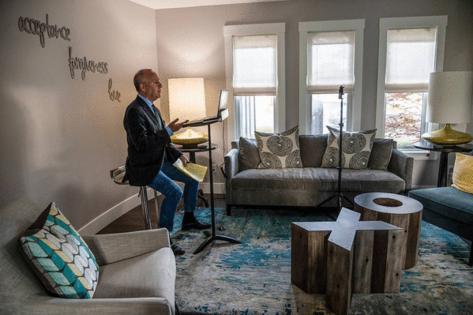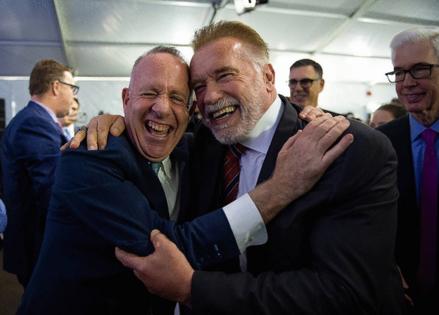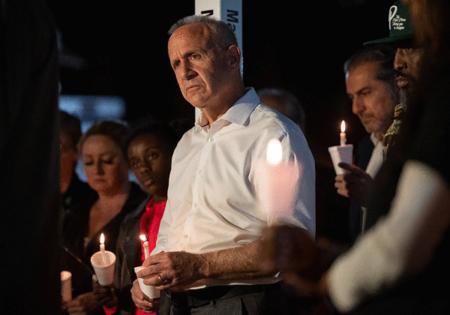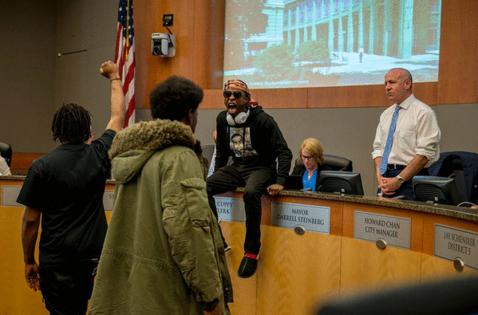Sacramento Mayor Darrell Steinberg reflects on legacy as term ends. 'I've done my best'
Published in News & Features
Unlike his predecessor, Darrell Steinberg’s legacy as Sacramento’s mayor may not be as striking as a new NBA arena erected in the middle of a dying downtown.
Instead, it may be a long list of little things that, when added together, he hopes made a big difference for the city’s underserved neighborhoods and communities.
A new community service center in south Sacramento. New futsal courts in North Sacramento. Free light rail and bus rides for all teens. An independent inspector general investigating the actions of Sacramento police.
“We have changed the arc of this city,” Steinberg said in a Nov. 25 interview reflecting on his eight years as mayor.
Although it’s not yet built, Steinberg, too, will have a stadium as part of his legacy. He led the charge for a new Sacramento Republic FC soccer stadium planned to open in the Railyards in 2027. He also championed plans for a major $40 million revitalization of the Old Sacramento waterfront.
Those are the types of amenities, he said, that will make Sacramento “grow up” from its roots.
Much of his time as mayor wasn’t spent on those types of development projects, though. Instead, about half his time the last eight years was spent on a task far less flashy — trying to get thousands of homeless people indoors.
Did homelessness get worse?
Many Sacramentans will look back on Steinberg’s term as a period when homelessness in the capital city multiplied.
When Steinberg was elected in 2016, a homeless census count estimated 2,858 homeless people were living outdoors in the city limits. The most recent count released earlier this year found that number had only risen by about 200 people, to 3,053.
However, residents may be skeptical of the accuracy of those numbers. Instead, they point to what they can see: encampments on sidewalks, along the riverfront and under overpasses seemingly multiplying over the last eight years.
Former Assemblyman Kevin McCarty, who will be sworn as the next mayor on Tuesday, said when he knocked on thousands of doors on the campaign trail, it was the issue he heard about nonstop.
Though not as on the forefront as when Steinberg initially campaigned for mayor, a need for housing rose to the top when he was elected. That’s why he embarked on a long list of strategies to get more shelters opened, so people could at least get out of the elements as they await permanent housing.
Throughout the years, Steinberg announced new plans to try to get his colleagues and the city manager to open new sites. Those efforts saw mixed outcomes. In 2020, partially to help with homelessness, Steinberg asked voters to approve a change in the system of government to give the mayor more power. Voters rejected it.
Nonetheless, the city now has over 1,300 shelter beds. That’s compared to less than 100 when Steinberg began his term.
“I’ll wear my scars proudly and know that I did my best,” Steinberg said. “There was a lot of trial and error. But if I had not leaned in, and the city had not leaned in, the problem would not have gotten better. In fact, it would’ve gotten much worse.”
Some Sacramento voters had big expectations the budding homeless crisis could be quashed in the hands of a political powerhouse like Steinberg, the former pro tem of the California Senate.
“In some ways I exceeded expectations,” Steinberg said, referencing a report that found 25,000 Sacramento homeless people have been housed since 2017. “But I think there was a broader expectation that I would be able to fix this. I never said I could fix it. But I think there was a hope, given my history, that I could.”
McCarty could face even larger roadblocks to get shelters open — the city is facing a projected $77 million deficit for the fiscal year that starts July 1. Steinberg endorsed McCarty for the role. Both had followed a similar political trajectory — serving both on the council and in the legislature before becoming mayor.
“As I step into the role of mayor, I want to acknowledge Mayor Steinberg for his exceptional leadership and vision in navigating the many challenges we faced with a steady hand and a deep commitment to the people of Sacramento,” McCarty said in a statement. “I hope to build upon his successes.”
A ‘rightful racial reckoning’
During his term as mayor, the city faced scrutiny for its policing practices.
In March 2018, the capital city made national headlines after police fatally shot Stephon Clark in his grandmother’s Meadowview backyard after mistaking his cellphone for a gun. Later the same year, police fatally shot Darell Richards, who was Black and Asian, after mistaking his pellet gun for a real one.
The outrage was swift, with protests shutting down freeways and dozens of people showing up to council to demand the city fire the officers and reduce police funding. The council, led by Steinberg, instead changed the policy of police foot pursuits as well as changed body camera placement to reduce accidental shut offs.
Then, in 2020, when Minneapolis police officer killed unarmed Black man George Floyd, this nationwide racial reckoning reignited the call for more police accountability. Hundreds of Sacramento residents again shut down streets and demanded the city reduce police funding.
Steinberg announced the city would create an inspector general position to independently investigate police misconduct. He also announced the city would create a new non-police entity to respond to non-violent 911 calls. That entity ended up not taking over any 911 calls, but did take over some 311 calls for homeless camps.
“I called it the rightful racial reckoning,” Steinberg said. “Sacramento is a diverse city — not only racially and ethnically, but it’s also diverse in terms of its views. I’d say that its a center-left city. I always considered myself progressive and still do. I also recognize that when you’re mayor, you are mayor for everybody.”
The little things
Steinberg used his position to find little ways to make the city better.
He started the Thousand Strong internship program that has paired more than 800 high schoolers with paid internships. He opened a mayor’s art gallery in City Hall. He used a grant program to attract more filming in Sacramento and one to increase big events, aimed to make Sacramento the “City of Festivals.”
“After the COVID shutdown you literally saved the arts,” said former California Assemblymember Dennis Mangers in a goodbye video played during Steinberg’s final council meeting Dec. 3. “We will always remember you as one of Sacramento’s greatest leaders.”
There’s also a whole list of organizations getting city funding that didn’t used to — those that serve the homeless, youth and those with mental illnesses.
“When I think of you, I think of the first glimmer of hope dawning for so many programs and services across our city,” said Wellspace Health CEO Jonathan Porteus in the video.
During the meeting, many of the council members mentioned one trait — his heart.
Council members Karina Talamantes and Katie Valenzuela both shared similar stories about being nervous to meet Steinberg years ago, when he was Senate pro tem, but they were each struck by his signature kindness and approach-ability.
“You have never shied away from leading with your heart,” said Councilmember Lisa Kaplan, who worked with Steinberg at the Capitol before City Hall. “You have never changed in that. You did not let your titles change you.”
What’s next?
After 32 years as an elected official, starting Tuesday, Steinberg will not be holding office.
It’s possible he never will again.
“For first time in my life, I have made a deliberate decision to take my time,” said Steinberg, 65. “It’s very not me. But I really want some time for reflection and a little time to read and write. This experience has been rich and it’s been great. But it’s been hard.”
Steinberg had previously said he may be interested in one last Big Leagues political job — running for attorney general if Rob Bonta ran for governor. But since Donald Trump was elected president, that scenario is much less likely.
Steinberg still may be interested in a judgeship, at either the California Supreme Court, appellate court or superior court level, he said.
Or, he may be done and instead his next chapter may be as a mediator type role for unions and employers, as he did last year with Kaiser Permanente workers.
“Whether or not you agree with the mayor always — and we haven’t always agreed — you cant deny your ability to bring people together to build real, big solutions,” Councilmember Katie Valenzuela told Steinberg during the Dec. 3 council meeting. “There are not many people who can do this role well.”
____
©2024 The Sacramento Bee. Visit at sacbee.com. Distributed by Tribune Content Agency, LLC.
















Comments